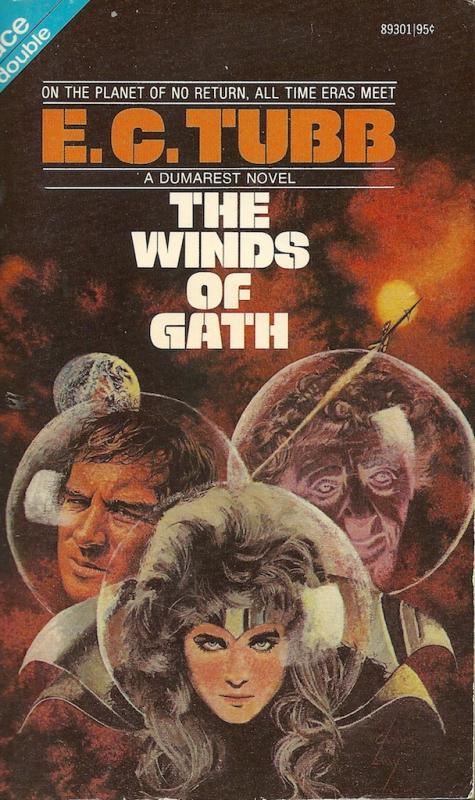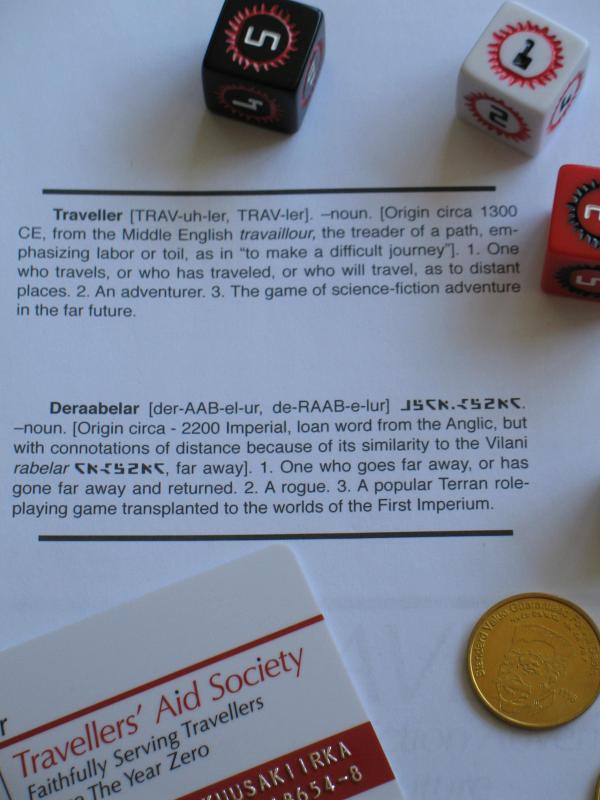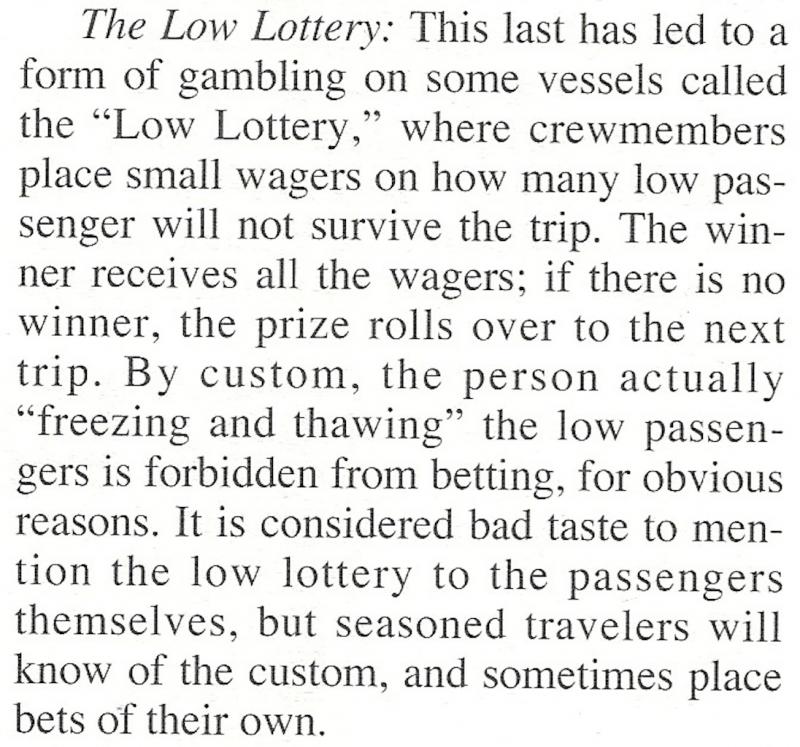 You know that time in the Firefly pilot when the IAV Dortmunder showed up just as the heroes were knee deep in a salvage operation…? The cruiser was firing up the gunships just as the crybaby lit off, Kaylee was warming up the engines while the loot was being stowed, and then, just as they begin to get away, Wash turns around and hollers, “hang on, travelers!” It’s kind of a strange line really. I mean, who talks like that? And why would the writer come up with an odd term for passengers and crew traveling between worlds…? There’s something odd about it.
You know that time in the Firefly pilot when the IAV Dortmunder showed up just as the heroes were knee deep in a salvage operation…? The cruiser was firing up the gunships just as the crybaby lit off, Kaylee was warming up the engines while the loot was being stowed, and then, just as they begin to get away, Wash turns around and hollers, “hang on, travelers!” It’s kind of a strange line really. I mean, who talks like that? And why would the writer come up with an odd term for passengers and crew traveling between worlds…? There’s something odd about it.
Fans of the classic role playing game Traveller could hardly be blamed for leaping to the conclusion that it was a shout out to them, especially when the events of the series turned out to be straight out of the game’s typical fare. The “shotguns in space” ethos is uncommon in a medium saturated with Star Wars and Star Trek tropes; they even did an entire episode on swordplay and the dueling culture of the nobility! Unfortunately, the evidence for a connection to the game is as inconclusive as it is interesting. We may never know for sure one way or the other if there’s really anything to it.
Going backwards to find the literary antecedents that inspired game’s application of the term is a little easier, though. Before the ill-fated television series was a glimmer in a anyone’s eye– before role playing games were even invented– a traveler was defined as someone that was crazy enough to lead the hobo’s life, world hopping on the cheap by taking low passage to a new system whenever sufficient funds could be scraped together. At least, that’s how it was in The Winds of Gath:
There was no need for heat in this part of the ship and no intention of providing comfort. Just the bare metal, the ultraviolet lamps washing the naked, coffin-like boxes with their sterilizing glow. Here was where the livestock rode, doped, frozen, ninety per cent dead. Here was the steerage for travelers willing to gamble against the fifteen per cent mortality rate.
Such travel was cheap– it’s sole virtue.
That’s right. The “travelers” rode with the cattle. These iconic cold sleep devices weren’t even designed for human use, hence their infamous unreliability. But there’s more:
“I didn’t ask them to come here. Penniless travelers swept up by the vagaries of space. Do you think I want them around?”
He strode to the window and looked through it, staring toward the camp. He had never minimized the danger of starving men, the strength of desperation. On this planet, wealth and poverty were too close; they had nothing but a little distance between them….
“They are part of humanity,” said Ely gently. He was accustomed to the sight of poverty. “Remember, brother, there, but for the grace of God, go you.”
“Spare me the sermon, monk.”
“Not a sermon, brother. Facts. They are here. You are the resident. They are your responsibility.”
“No!” Piers was emphatic. “I refuse to accept your moral judgement. In law they are nothing. They came here by their own free will. They can leave the same way or stay until they rot. I am not responsible.” Irritably he again paced the floor. He hesitated by the dispenser then moved away. “Each storm I arrange for a passage and run a lottery. The winner gets the passage. Sometimes, if the money is enough, more can win the prize.”
The old Traveller game had the institution of a “low lottery,” a betting pool run on a starship with the pot being split between the people that correctly guess the number of people that will fail to survive the low passage process. In the book, that instead turns out to be a charity run by the local factor. Wow, does that ever make so much more sense…! I always had a hard time wrapping my head around that darkly cynical aspect of the game. I mean, what if a family had to travel “low” for some reason…? The results of the trip could be so devastating, I couldn’t imagine people making it routine to make light of it.
Though E. C. Tubb was more sensible about this particular aspect of his universe’s setting, the life of a “traveler” was far from romantic. Indeed, the term was fairly derogatory:
“A high passage is plenty of loot for a–” He broke off. Dumarest finished the sentence.
“For a stranded bum of a penniless traveler?” His voice was very gentle. “Is that what you were going to say?”
“No!” The man was sweating. “Look, no offense. Have another drink.”
These are not sketchy ex-military types bumming around the galaxy in a type S scout/courier. They’re nearly starving beggars that are lucky even to have clothes. There are no patrons like Badger or Niska from the Firefly episodes or like the foppish young noble from Adventure 1: Kinunir.¹ In The Winds of Gath, what little work is available is the unglamorous, the menial, or the deadly… and liable to be all three at once. In comparison to these guys, the typical first level D&D character is fabulously well equipped with his 3d6x10 gold pieces, dashing plate mail armor, and effectively unlimited iron rations. Compared to a “traveler”, a penniless beginning Car Wars character with 3 DP, three skills at base level, and a slim chance of picking up some wheels in an Amateur Night death match is taking advantage of an incredibly generous opportunity. And while the chance of death in Traveller character generation completely fits with the setting we see here, those characters that do successfully muster out from a military career are positively rolling in the credits in comparison.
Another thing about that: in rolling up a Traveller character, I have never gotten terribly excited over the Low Passage and High Passage results on the benefits table. I usually either ignore them or just trade them in for credits. But In The Winds of Gath, these things are an extremely big deal; they’re literally to die for. The role playing game simply doesn’t come close to expressing that.
In Traveller, High Passage always signified first class accommodations and perhaps even entertainment on par with that of the cruise ships of twentieth century Earth. It’s a catchy term– and the game company FASA (creators of BattleTech) actually got their start as a Traveller licencee producing a magazine with that title. But in E. C. Tubb’s book you find out it was more aptly named than most gamers realize: those passengers are not only high class, but they’re also high on “quick-time” in order to decrease the apparent duration of the journey. And what’s more, the dichotomy between high and low passage carries over into planetside dealings. Instead of a generic “startown” or the bustle of a heterogenous and cosmopolitan Mos Eisley, the two classes of visitors instead sort themselves into a segregated High Town and Low Town. That sort spin on such a fundamental aspect of the game is unlikely to ever cross a referee’s mind. It’s just not how things are done in Traveller.
As for the book itself, it unfortunately comes off here looking like a watered down version of Dune. It has a depraved Prince whose appetites and debaucheries have ruined entire worlds, but as far as undiluted evil goes, he’s really not worthy to unlace the baron Harkonnen’s boots. There’s a knock off of the Bene Gesserit here, but the matriarchy in this book can barely hold onto a single world, much less implement a centuries spanning conspiracy. And the mentat-like Cyclan is closer to a C3PO than to the indefatigable Thufir Hawat. There’s no all-powerful emperor, no insidious and tight-fisted Guild, and no byzantine collection of scheming noble houses giving depth and color to the background and backbone to the sprawling setting. There’s just straight ahead action… and that’s it! We get a little bit about Earth becoming a thing of myth– a trope that’s inspired me since I first read the Foundation Trilogy– but we get very little information about the nuts and bolts of space travel and the nature of interstellar governance and economics.
The protagonist, however, is quite enjoyable to observe as he runs a gauntlet of death and intrigue. He possesses the confidence a James Bond playing Baccarat at a casino and the danger sense of a Conan on the prowl. He never fails to take initiative. Anyone else would quit when they were ahead, but when the chips are down, Dummarest of Terra is the type of guy that goes double or nothing. His greatest asset is neither physical strength nor astounding skill, but rather the fact that he’s been just about everywhere and seen everything at least once. He is cunning and eminently aware of his surroundings. Though the odds of him actually surviving what I presume were over a hundred trips at low passage are infinitesimally small², I am quite happy to go along for the ride as long as he’s in the spotlight.
The funny thing about the bits from this book that were glommed onto Traveller is that they had very little impact on how the game was ultimately developed and played. Players seem to pick up on all the nuances of Book 1: Characters and Combat in short order. Maybe they miss the implications of the Dumarest-inspired drug listing because it’s tucked away in an odd corner of Book 2: Starships along with the experience rules that so many people think don’t exist. On the other hand, the future as we understood it was far less drug-addled by the early eighties even if we were, as a society, in the process of beginning massive experiments with mood altering drugs on an unprecedented scale. The Dumarest series and the Dune series each appear almost quaint now when they depict various drug trips as being a linchpin of interstellar civilization. In comparison, people that have never role played before will immediately see the implications of having a mirror be on a D&D equipment list. (“Are there basilisks in this game?”) But I’ve never seen people go shopping for “fast” or “slow” drugs at the start of a session and I’ve never heard of referees arguing about how they handle their effects in their campaigns.
E. C. Tubb’s work played a key role in getting the Traveller role playing game off the ground, but like scaffolding that aids in the construction of a monument, it was no longer integral to the structure after the initial design work was completed. As is often the case with such games, the more offbeat and incomprehensible elements were quietly passed over and deemphasized over time. And yet a hard edge of the Dumarest series remains: fragments of a pulpy, uncaring universe populated with the desperate and the sadistic. Whenever players blow through a dozen worlds in half as many game sessions or get into trouble as a side effect to their living hand-to-mouth, they walk in the footsteps of the grandfather of all travelers: Earl Dumarest. It’s a great contrast to the squeaky clean future presented in Star Trek where people don’t even need money anymore. The problems in Traveller and Firefly always center on the human element and you can’t just “reverse the polarity” and walk away from them. This aspect of the material is key to the enduring appeal of both.
—
¹ Note that the second book of this series opens up with what is essentially a patron encounter, but it appears to be a special case and not the norm for the average traveler.
² Although he may not have traveled low for all one hundred of those trips, the odds of surviving even ten of them is less than one in five.
I am no expert in probabilities, so please show me the correct way to figure this if I am wrong, but I think for a 50% death rate, 1/2, the chances of surviving 10 trips would be 1/(2^10) = 1/1024
-
Given an 85% chance of survival on a single low passage trip, the chance of surviving ten trips is .85^10 which is a probability of .2, 20%, or one in five.
-
Ah, I read fifteen as fifty. It is good to know that I remembered the process correctly, even if the input was wrong. Thank you.
-
Um, I was told there would be no math in this retrospective!
-
I’ll try to steer clear of the fact that UWP the size codes are not in metric and also that those PGB codes are equally wrong because the population multiplier results in a non-logarithmic distribution. #ThingsThatBugTravellerPlayers

